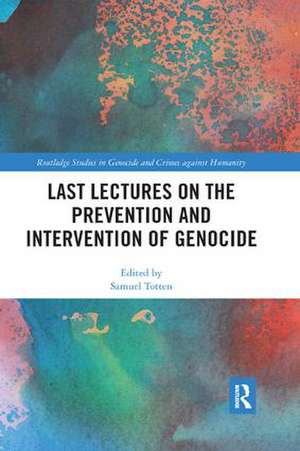Last Lectures on the Prevention and Intervention of Genocide: Routledge Studies in Genocide and Crimes against Humanity
Editat de Samuel Tottenen Limba Engleză Paperback – 4 feb 2019
The contributions to this volume are thought-provoking, engaging, and at times controversial, reflecting the scholars’ most advanced thinking about issues of human rights and genocide.
This book will be of great interest to professors, researchers, and students of political science, international relations, psychology, sociology, history, human rights, and genocide studies.
| Toate formatele și edițiile | Preț | Express |
|---|---|---|
| Paperback (1) | 383.44 lei 6-8 săpt. | |
| Taylor & Francis – 4 feb 2019 | 383.44 lei 6-8 săpt. | |
| Hardback (1) | 985.41 lei 6-8 săpt. | |
| Taylor & Francis – 28 sep 2017 | 985.41 lei 6-8 săpt. |
Preț: 383.44 lei
Nou
Puncte Express: 575
Preț estimativ în valută:
73.39€ • 76.28$ • 60.79£
73.39€ • 76.28$ • 60.79£
Carte tipărită la comandă
Livrare economică 04-18 februarie 25
Preluare comenzi: 021 569.72.76
Specificații
ISBN-13: 9780367194987
ISBN-10: 0367194988
Pagini: 348
Ilustrații: 6
Dimensiuni: 156 x 234 x 19 mm
Greutate: 0.5 kg
Ediția:1
Editura: Taylor & Francis
Colecția Routledge
Seria Routledge Studies in Genocide and Crimes against Humanity
Locul publicării:Oxford, United Kingdom
ISBN-10: 0367194988
Pagini: 348
Ilustrații: 6
Dimensiuni: 156 x 234 x 19 mm
Greutate: 0.5 kg
Ediția:1
Editura: Taylor & Francis
Colecția Routledge
Seria Routledge Studies in Genocide and Crimes against Humanity
Locul publicării:Oxford, United Kingdom
Public țintă
Postgraduate and UndergraduateCuprins
Foreword: Ervin Staub; Introduction: Samuel Totten; Part I. Fundamental Concerns; A. Humanity’s Responsibility; 1. "Using Norms, Knowledge, and Narratives for the Prevention of Crimes Against Humanity and Genocide" Johanna Ray Vollhardt; 2. "To Act or Not to Act Immediately? Is There Really a Question?" Agnieszka Bieńczyk-Missala; 3. "Between Empathy and Fear: Recalibrating Incentives for Atrocity Prevention" Eyal Mayroz; 4. "When Outsiders Are Threats: How to Move Beyond a Culture of Fear to a Shared Sense of Humanity" Carla Barqueiro; B. Critical Factors Vis-à-vis Issues of Prevention and Intervention; 5."Preventing Deadly Conflict" I. William Zartman; 6. "The Foot Soldiers of Evil – On the Importance of Individual Perpetrators in Genocide Prevention" Timothy Williams; 7. "Protection of All Peoples: Ending Double-Standards and Embracing Justice" Stephen Zunes; 8. "Genocide and/or Ethnic Cleansing: Recognition, Prevention and the Need for Definitional Clarity?" Clotilde Pégorier; Part II. Lack of Political Will Is Not the Only Obstacle to Preventing Genocide; 9. "Will the World Ever Be Interested In Stopping Atrocities?" Kurt Mills; 10. "How Three Common Misconceptions Get in the Way of Preventing Genocide" Lawrence Woocher; 11. "When Are We All Truly Going to Get Serious?" Samuel Totten; Part III. Commentary on Past and Current Approaches to Prevention and Intervention; 12. "Whither Anti-Genocide Efforts? Some Personal Reflections" Thomas G. Weiss; 13. "The Final Battle" Alex J. Bellamy; 14. "Questioning the Turn Towards the "Responsibility to Prevent" Aidan Hehir; 15. "Why the R2P Backfires (And How to Fix It)" Alan J. Kuperman; Part IV. Innovations Still to Be Considered/Implemented; 16. Local Structures of Prevention and the Obligation to Prevent Genocide as an Individual Right Ekkehard Strauss; 17. "The Al Capone Strategy: Follow The Money" Rebecca Tinsley; 18. "Reducing Genocides, One Region At a Time" Edward Kissi; 19. "The Time Has Come for Genocide Scholars to Innovate: The Critical Need to Develop and Implement New and Unique Tools for Prevention" Israel W. Charny; 20. "Putting Moral Agency and the Precautionary Principle to Work for the Prevention of Genocide and Its Incitement" Elihu D Richter; 21. "Rethinking Genocide Prevention" Gregory H. Stanton; 22. "Subterranean Atrocities: A Twenty-First Century Challenge for Mass Atrocity Prevention" Charles H. Anderton; 23. "Using Satellites to Detect Mass Human Rights Violations: A Call for the International Community to Implement an Early Warning Detection System" Andrew Marx; Part V. Holding Perpetrators Responsible: No Impunity; 24. "No More Lies: Genocide Prevention through Perpetrator Accountability" Melanie O’Brien; 25. "Lessons Staring Us in the Face" Linda Melvern; Part VI. Now What?; 26. "Resilient Societies and Atrocity Prevention" Stephen McLoughlin; 27. "Whither Genocide Prevention?" Karen E. Smith; 28. "Why the (Western) Cavalry Isn’t Coming and What We Can Do About It" Maureen S. Hiebert; 29. "‘So the World May Know All’: The Importance of Education for Genocide Prevention" Deborah Mayersen; 30. "All the Candidates Agreed About Darfur, and Then …." John Hagan; 31. "What’s It Going To Take? Last Thoughts on Preventing Genocide" John Hubbel Weiss; 32. "From the Clenched Fist to the Open Hand: A Last Lecture and First Lesson from Critical Genocide Prevention Studies" Alexander Laban Hinton; 33. "Genocide Structures the Very World We Live In" Henry C. Theriault; 34. "My Last Lecture: Some Central Elements of Prevention" Ervin Staub; 35. "The Withdrawal of States from the International Criminal Court: A Potential Set Back in Relation to the Prevention of Genocide and Crimes Against Humanity?" Etienne Ruvebana; 36. "Anti-Genocide" Christopher Powell; 37. "So Where Do We Go From Here? A View from Bosnia and Herzegovina" Edina Bećirević; 38. "Double Standards and the Quest for Justice" William A. Schabas; 39. "Making Sense of the Senseless" Michael Barnett; Afterword Mukesh Kapila
Notă biografică
Samuel Totten is Professor Emeritus at the University of Arkansas, USA. In July and August 2004, he was one of 24 investigators on the US State Department’s Atrocities Documentation Project, and in 2008 he served as a Fulbright Scholar at the Centre for Conflict at the National University of Rwanda.
Descriere
An innovative collection of hypothetical ‘last lectures’ by the world’s top scholars in the fields of human rights and genocide studies, each chapter purportedly constitutes the last thing the author will ever say about the prevention and intervention of genocide.














